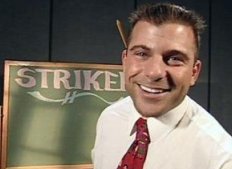Wrestling 101: Class is in Session
Similar to boxing and MMA fighting, professional wrestling is not fake. Unlike boxing or MMA fighting, however, professional wrestling is scripted, meaning that wrestling promotions book matches, as well as the matches’ outcomes. Despite this fact, the millions… and millions of wrestling fans continue to follow this bizarre form of sports entertainment today.
Yes, sports entertainment, as we like to call it, is best known as a male adult-geared soap opera, complete with its own lingo, which spectators must be familiar with in order to understand just what is going on in the program. So, if you’re going to be following my articles in the future, I’d like to set sound ground rules so that you can benefit from reading them, instead of, well, not benefiting (for lack of a better term).
I have compiled a list of definitions to refer to when reading about mine, or anyone else’s, articles on professional wrestling. Again, this is only help you, my faithful readers, interpret just what I am trying to say in my articles. Ladies and gentlemen, this is Wrestling 101.
Kayfabe
The basis of professional wrestling, that is putting on a show by keeping outsiders unaware of the business’s secrets; literally means, “fake.”
Wrestler
These athletes are the main focus of wrestling; highly trained performers that battle for titles and championships.
Referee
The performer who calls the match. He or she is essentially a prop used to communicate between the wrestlers and the production staff, who run the show. Communicating real injuries that occur, the amount of time the wrestlers must work during the match, and when to finish the match or deviate from the planned finish are crucial aspects to a wrestling match’s value.
Manager
Often a sidekick or someone who is used as a means of support or wisdom by accompanying the wrestler at ringside during matches.
Stable/Faction
A union of wrestlers who share a common goal or objective.
Angle
Events or actions that ultimately progress into a feud between wrestlers.
Feud
A storyline between two or more wrestlers that culminates in a match to settle the dispute (usually at a pay-per-view).
Babyface
(Face, for short) The good guy, or hero, in a feud, whose purpose is to generate pops from the audience.
Heel
The bad guy, or villain, in a feud, whose purpose is to generate heat from the audience.
Pop
A cheer, or a loud reaction from the audience at a live event; occurs often when cheering for a face or after witnessing a spot.
Heat
In kayfabe, booing or jeering from the audience at a live event, often directed at a heel or a turning face. Heat also refers to wrestlers’ grievance toward another backstage.
Turn
An occurrence or revelation leading to a face wrestler becoming a heel, or visa versa.
Swerve
An unexpected occurrence, calculated by a wrestling promotion in an attempt to trick the audience.
Spot
A point of interest, or high-risk maneuver meant to attain a reaction from the audience during a match.
Selling
A wrestler’s art of making an opponent’s moves look like they hurt to certain degrees, and thereby creating an illusion to enhance a match’s plot line.
Shoot
Occurs when something is done disregarding the script of a wrestling show or event.
Example: a wrestler really hurting an opponent, or saying things that are out of character.
Work
Anything to do with following the script of a wrestling show or event.
Worked Shoot
Occurs when a wrester adds real life elements into his or her comments or matches without deviating from the script.
Blade
Razors used to induce bleeding, and therefore heighten the intensity of a match; when a wrestler makes himself bleed during a match or confrontation (Blading).
Bump
A fall taken by a receiving wrestler.
Hot Tag
An anticipated tag that proves to give the face tag team the upper hand in a match.
Finishing Move
A wrestler’s signature move meant to end all moves, and the match.
Job/Jobber
The act of a wrestler losing a match in order to get another wrestler over with the audience; a wrestler who continually loses matches, to the point of not being taken seriously by fans.
Promo
Time spent talking on the microphone by a wrestler, often speaking to the audience or another wrestler.
Push
Promoting a wrestler, team, or stable by booking them to win matches, a title, or feud in terms of popularity.
I hope that I’ve somewhat enlightened you on the world of professional wrestling after having read the information in this article, and I look forward to keeping you informed in the future.
Until next time…


